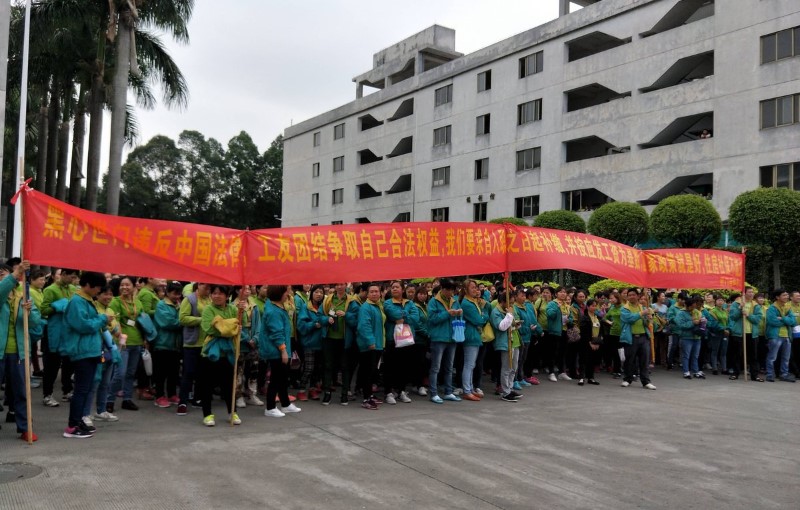Guangdong workers show once again how collective bargaining should be done
14 March 2018After nine days on strike, around a thousand workers at a luxury handbag factory in Guangzhou returned to work today after successfully negotiating the back payment of long overdue social insurance and housing provident fund contributions.
In a document signed by Guangzhou Panyu Simone Handbag Limited President Park Ki-choon, the company agreed yesterday to pay all workers their social insurance and housing provident fund contributions by 31 July and 31 December respectively.
“After nine consecutive days of collective action, we finally reached an agreement with the management of Simone Handbag on 13 March. We have basically achieved our goals and all workers will return to their posts on 14 March,” a statement issued by worker representatives yesterday confirmed.

Simone Handbag workers on strike at the factory in Panyu
The statement stressed however that: “Our other demands will be dealt with in the ongoing collective bargaining. Management has also committed to refrain from retaliating against worker representatives, who will continue to engage management in this process, monitoring the effective implementation of the agreement.”
The Simone workers, nearly 70 percent of who are women, had elected their representatives under the guidance of the Panyu district trade union and called on management to engage in collective bargaining in early March.
Initially however, they encountered not only reluctance from management but outright sabotage. On 7 March, they identified a man dressed in factory uniform spreading rumours and undermining solidarity. The saboteur was later taken away by police. Management also tried to discourage workers on strike by labelling their actions “illegal” in loudspeaker announcements throughout the factory.
In response, the worker representatives issued an open letter calling on management to stop all actions that violated the principle of good faith bargaining and urged them to resume negotiations and “resolve this labour dispute for the benefit of both parties.”
Worker concerns regarding the future of their jobs started when rumours about a possible factory relocation spread. Simone, a Korean ODM company with international clients like Michael Kors, Marc Jacobs and Coach, operates six plants in China, Cambodia and Vietnam, and had more than five thousand workers at the Panyu plant at one stage.
Operations started moving from Panyu to other plants last year and there were reports of staff being forced to quit their jobs. Some of the workers, who had had worked at the factory for more than ten years, were worried that they would never get their social insurance benefits paid in full before the relocation was completed.
Workers started filing their case with the local Panyu authorities and, in early 2018, they received official confirmation from the local housing and social insurance bureaus that Simone was in breach of the law with, in some cases, unpaid contributions dating back to 1999.
Workers initially wanted to clear back payments by 31 March but management said the administrative procedures were too complex to meet the deadline. After deliberation and consideration, the workers agreed to a compromise and allowed management’s request for an extension.
Well known labour scholar Wang Jiangsong praised the workers “exemplary victory” on Twitter, adding that the dispute had all three essential elements for a successful resolution; “worker organisation and solidarity, management’s rational response, and active government (official union) engagement.”
Simone Holdings claims it accounts for 30 percent of the American market and ten percent of the worldwide market for luxury accessories. It started manufacturing luxury bags for international brands 30 years ago and today produces handbags for more than ten brands.
Michael Kors is one of Simone’s main international customers, in its Code of Conduct for International Partners, the American designer brand states that suppliers “must comply with all laws regulating local wages, work hours and benefits” and “should respect the legal rights of employees to freely and without harassment participate in worker organizations of their choice.”
